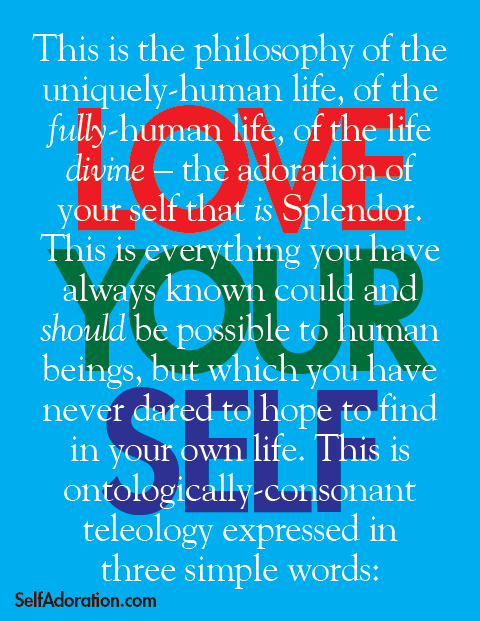The book presented and developed a brand new theory of egoism, arguing from the origins of the reflexively-aware self-image to an exploration of the ontologically-consonant values of that self, the object of every truly self-interested act.
You should read Man Alive if you haven’t – and read it again if you have – but here’s the crux of the matter, the reason I make the seemingly outrageous claim that I invented egoism:
The name philosophers give to any ethical doctrine promoting self-love or self-interest is egoism. I use that term myself to describe the system of ethics I am elaborating here, but I’m not crazy about it.
First, most creeds that call themselves egoism actually refer to invalid ideas of the self whose interests are to be served. Either “self” is used to mean the reflexive idea of the bodily self or to self-identity – the object of sentences like “I clothe myself” or “I promote myself on the internet.” Or “self” is deployed as a matter of bodily or pecuniary utility: “It was to my self-interest to take a loss on this one deal in order to hang onto a valuable client.” There is nothing wrong with any of these behaviors, they just don’t have anything to do with the actual human self, the self as we documented it in the last chapter.
The second type of ethical creeds called egoism is actually other-centric. Whether the philosopher claims that his egoism permits him to dominate other people, or that his egoism forbids other people from dominating him, the focus of the doctrine is not the self at all – not the self as I describe it nor even the reflexive or utilitarian self – but is instead those other people.
I’m inclined to think that most philosophical or theological arguments – of all sorts – are essentially Cargo Cults: The doctrine in all its interminable, incomprehensible verbiage exists to justify some desired end-state goal the proponent had already upheld in advance of writing his supposed defense of that “inevitable” outcome. The theorist works backwards, from the conclusion to the allegedly-validating premises and evidence, tying everything up with a tidy rhetorical bow. This is completely invalid as a matter of method, of course, since the map is not the territory. It is simply absurd, when you cut through all the fog, for the champion of some doctrine to insist that human nature is what his theory commands that it “must” be. If you tell me these folks are deliberately fooling themselves, I will happily agree with you. My concern is that they do not fool you.
This week at The Church of Splendor, I celebrate the fourth anniversary of Man Alive, addressing the folks it has helped and will help to lead happier and more fulfilled lives – starting with me:
















